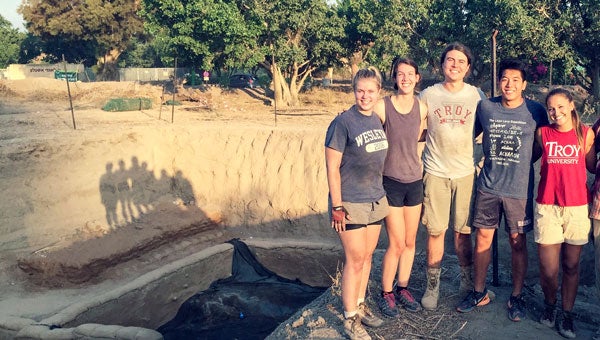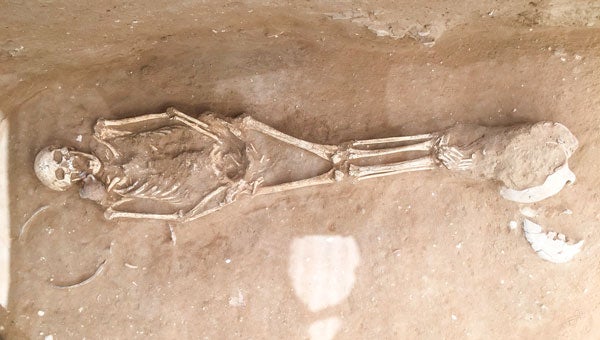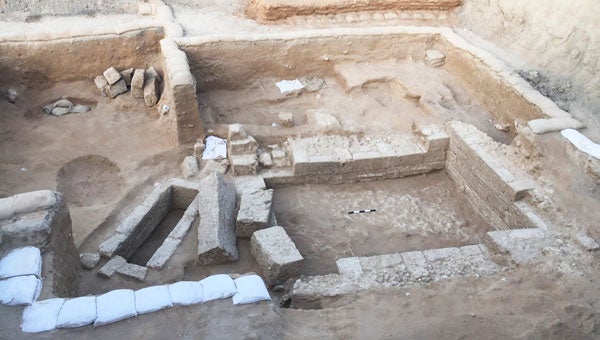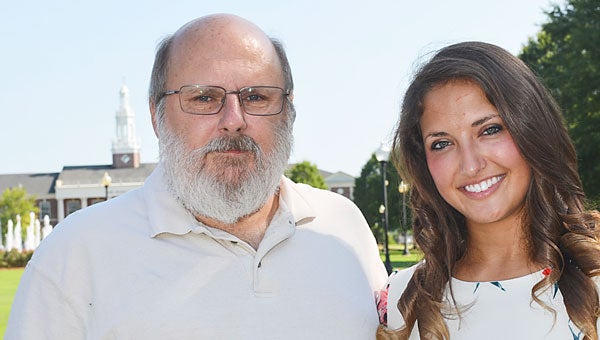DIGGIN’ UP BONES: Savanna Moore joins Israeli archeological excursion
Published 3:00 am Saturday, July 23, 2016

Savanna Moore a Troy University Senior participated in the archaeological excursion in Ashkelon, Israel. The excavation included the discovery of the Philistine cemetery, the first of it’s kind. She is pictured with student volunteers including Troy University graduate, Clayton Johnson of the Dothan area. He has participated in 4 digs in Israel. The skull of 3,000 year old Philistine man was discovered in the Israel dig. Dr. Bill Grantham, professor of anthropology at Troy University, he has been a leader in the Troy University program to involve students in archaeological excavations. Skeletal remains of another Philistine was reconstructed by volunteers at the excavation site. The remains and objects found at the excavation site had not been seen by the light of day for 3,000 years.
Savanna Moore was surely in the audience and heard that little cartoon character tip movie goers that “If it ain’t an adventure, it ain’t worth doing.”
If grades were given for “adventuring,” Savanna would be at the top of her class.
Moore, a liberal studies major at Troy University, is making sure that her senior year is an adventuresome one.
She just returned from Israel where she participated in the final archeological dig of the Leon Levy Expedition to Ashkelon.
Moore was among the five Troy University students who joined students from Boston College, Harvard University and Wheaton College as the final digs closes in the ancient Philistine city.
Troy University joined the Leon Levy Expedition that began in 1985 in 2012. Dr. Bill Grantham, Troy University professor of anthropology, has inspired teams of students to join the expedition. Moore was among them.
“When I heard Dr. Grantham talk about the expedition and its importance, even though I had no experience with anything like that, I decided ‘I have to do this.’”
A world away from home and up to her elbows in mud, Moore was keenly aware that she was involved in a once-in-a-lifetime experience.
“Being a part of the expedition, being a part such a historic event was the best thing of my life,” she said.
The expedition includes the first Philistine cemetery ever discovered.
In 2013, following 30 years of exploration and digging outside the Israeli city of Ashkelon, archaeologists uncovered the Philistine cemetery.
Grantham said the discovery of the Philistine cemetery and, with the use of DNA, archaeology could be close to discovering the secrets of their origin.
The Philistines are described in the Bible as the enemy of the ancient Israelites. They ruled the Ashkelon area of the eastern Mediterranean from the 12th century BC but little is known about them, Grantham said.
Between 150 and 200 bodies are buried in the cemetery. Contrary to the widespread belief that the Philistines were an uncultured people, some of the Philistines were buried with different kinds jewelry and perfumed oils.
“It was amazing to see the objects in the burial chambers and to know that those objects had not seen the light of day for 3,000 years,” Moore said. “I didn’t realize that ‘digging’ was such a slow process but seeing those objects and the skeletons you realize it has to be that way so that you don’t disturb or destroy any small part of history.”
Moore said that, to see, the remains of people who lived thousands of years ago was a feeling that she can’t describe.
“It was almost unbelievable to know that those skeletons, those bones were people who lived thousands of years ago. It is almost unbelievable,” she said.
Moore happened to be digging at the time that a massive chamber of the cemetery was discovered.
“No one realized for a while that what had been found was actually the corner of a large chamber,” she said. “It was exciting to be a part of that discovery.”
Moore said every day of the six weeks that she participated in the dig was a learning experience.
“We received direction and input every day,” she said. “The digging alone was a learning experience and learning about the history of the region and the Philistines made everything real.”
Moore said one of the most rewarding parts of the program was the lecture series in which they learned about the many facets of ancient Ashkelon.
“The more we learned about its history the better we could comprehend the magnitude of our findings,” she said. “We also learned from each other. Being with people from different parts of the world was educational. There would be around 50 people at the site all the time. Some of them were from Israel, some from German, Africa, Japan, China and South America. It was just amazing to be there and to be doing what we were doing. It was an experience I’ll never forget and always treasure.”
Before come back to her hometown of Montgomery, Moore had an opportunity to go to Jerusalem and visit all of the Holy sites.
“To be there at those Holy places was inspiring, a true spiritual experience,” she said. “That alone was worth it all.”
Moore said that looking back on the summer, she is grateful to have worked with such notable individuals in the field of archaeology as Daniel Master and Lawrence Stager as well as the entire Leon Levy Expedition to Ashkelon.
“As students, we were given a unique opportunity to work in the field uncovering the ancient Philistine burials, as well as processing, identifying, and preserving the artifacts that we found buried with them,” she said. “I am truly grateful for Troy University’s commitment to giving its students life-changing opportunities like mine.”
Prior to digging up history, Moore worked with the Alabama State Council on the Arts, the Montgomery Museum of Fine Arts and the Shakespeare Festival. Her next adventure will be working at Shiloh National Military Park in Tennessee.
“At Shiloh National Military Park and any other opportunities that I have, I will strive to make sure history continues to have a voice,” she said.





